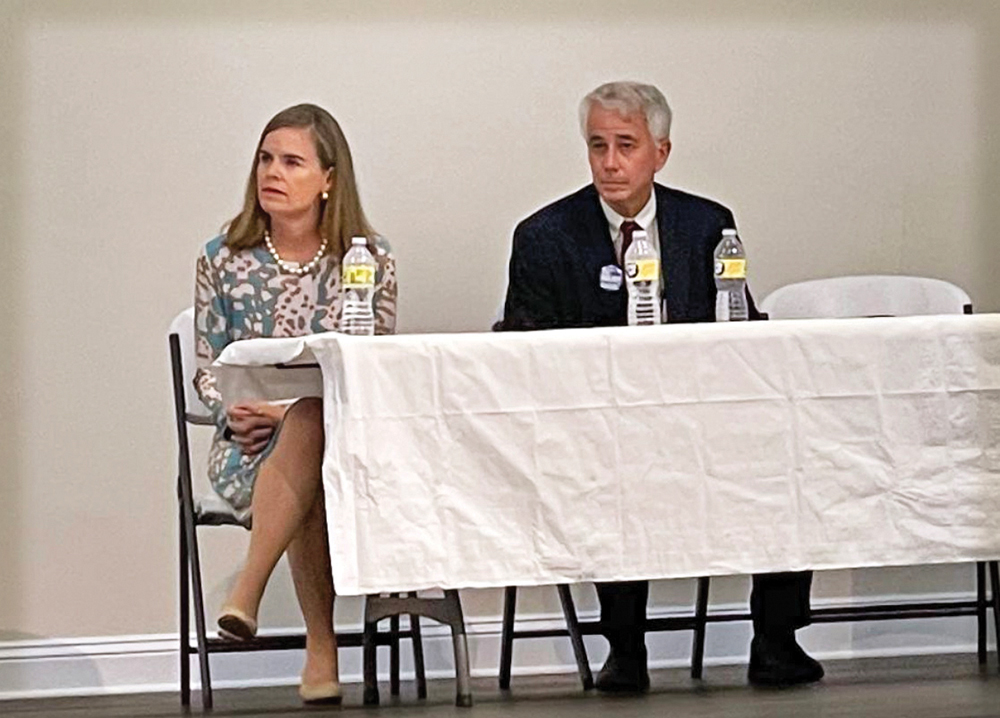As the August 4th countywide election cycle winds down, the marquee race is still, as before, that for district attorney general between Republican incumbent Amy Weirich and Democratic challenger Steve Mulroy. The race remains the focus of attention in local politics. It has also engendered significant statewide and national attention.

The Tennessee Journal, a weekly which is the preeminent statewide source for political news across Tennessee, featured the race in its lead story for the July 15th issue. Editor Erik Schelzig recaps some of the significant charges and other back-and-forths of the contest, highlighting the two candidates’ major differences regarding the state’s new “truth-in-sentencing” law, which eliminates parole in several major violent-crime categories.
Weirich, who boasts her years-long efforts on behalf of passing the law, points with pride. Mulroy sees it as a case of vastly increasing state incarceration expenses while blunting possible rehabilitation efforts.
In the several recent debates between the two candidates, the challenger notes that his skepticism puts him on the same page regarding “truth-in-sentencing” as opponents like the American Conservative Union and GOP Governor Bill Lee, who declined to sign the bill, letting it become law without his signature. Weirich seizes upon Mulroy’s mentions of that fact as an opportunity to advertise her purported independent-mindedness, noting that she also disagrees with Lee (and the Republican supermajority) on such issues as open-carry gun legislation. “I don’t care what the American Conservative Union says,” she adds.
All that being said (and it’s consistent with her would-be crossover slogan, “Our DA”), the race as a whole is between Weirich’s right-of-center hard line and Mulroy’s highly reform-conscious point of view. Mulroy wants cash-bail reform and systematic post-conviction reviews, the latter including DNA testing. Weirich is open to modifications in those areas but not to major changes.
The two have battled over the matter of alleged racial disparity issues in the DA’s office, with Mulroy charging, among other things, that Weirich has an 85-percent white staff of attorneys prosecuting a defendant population that is 95 percent Black. Weirich says she’s trying to alter the ratio but cites the difficulty of competing with better-paying private law firms in efforts to acquire African-American legal talent.
Both contenders have seemingly forsworn the Marquis of Queensberry rules regarding the etiquette of competition. With no real evidence to base her claim on, Weirich’s ads consistently try to saddle Mulroy with the onus of being a “Defund the Police” enthusiast. He answers that he would like to see more police hired, and at higher salaries, and given “better training.” His ads portray Weirich as being a Trumpian (a stretch) and the “worst” district attorney in Tennessee, one saddled with several citations for misconduct from state overseeing bodies and with an ever-rising violent-crime rate during her 11-year tenure that is the worst in the nation.
The two candidates took turns in verbally pummeling each other in a series of almost daily formal debates the week before last. The venues were the Rotary Club of Memphis, the Memphis Kiwanis Club, and an Orange Mound citizens’ association. Neither gave any quarter, each attacking the other along lines indicated above.
Much of the aforementioned Tennessee Journal article is dedicated to the two candidates’ fundraising and campaign spending. In the second quarterly disclosure of the year (April through June), Weirich reported raising $130,400 and spending $240,400 — much of it on the Memphis consulting firm of Sutton Reid, where her blistering TV and radio ads are prepared. She began the quarter with nearly half a million dollars on hand and ended it with $361,00 remaining.
Mulroy raised $279,000 in the period, a sum which included a loan from him to his own campaign of $15,000. He spent $194,000 and had a remainder on hand of $159,000.
As noted by the Journal, Weirich has gotten almost all her funding from within Tennessee, all but $1,600. Mulroy, who has the avowed support of such celebrities as singer John Legend and author John Grisham, is also boosted by several national groups with a professed interest in criminal-justice reform. Some 35 percent of his funding has come from out of state.
One key venue for Mulroy is New York, where he has traveled twice recently, attending public occasions in tandem with such supporters as criminologist Barry Scheck, mega-lawyer Ben Crump, and entertainer Charlamagne Tha God. Mulroy’s travels and his funding sources are reportedly the target of a new Weirich TV spot which begins this week. It should be noted that the vast majority of Mulroy’s trips out of town during the campaign — all unpublicized until now — have been to Pensacola, where he drives down regularly to look in on his elderly mother.
With early voting about to expire and a week to go before the judgment day of August 4th, polling information is being held close to the vest by both principals, though Mulroy publicized an early one showing him with a 12-point lead.
A fact that looms large to all observers and to both participants and their parties: The position of district attorney general, is, as of now, the only major countywide position held by a Republican. Early voting statistics gave evidence of serious turnout efforts by both parties.
• There are other key races, to be sure. The race for county mayor, between Democratic incumbent Lee Harris and Republican challenger Worth Morgan has been something of a back-burner affair, with neither candidate turning on the jets full-blast in the manner of the DA race. Harris basically is resting on what he sees as a high productive record, and Morgan, though he challenges that, saying the county “deserves better,” has not featured many specifics beyond Morgan’s ill-based claim that Harris has — wait for it — defunded the police (strictly speaking, the Sheriff’s Department).
A recent TV ad shows Morgan in interview mode, chatting about his life and outlook and looking and sounding likable. Given Harris’ edge in incumbency and party base, that is probably not enough for now, but it does bolster Morgan’s name and image for later on.
In the race for Juvenile Court judge, Dan Michael’s incumbency works for him, while his opponent, city Judge Tarik Sugarmon, has a well-known local name and an active Democratic party base working on his behalf. Michael is heavily backed by the GOP in what is technically a nonpartisan race.
Few surprises are expected elsewhere on the ballot, though Democratic County Clerk Wanda Halbert, who has fumbled the issuance of new automobile plates, may get a scare (or worse) from Republican opponent Jeff Jacobs.
